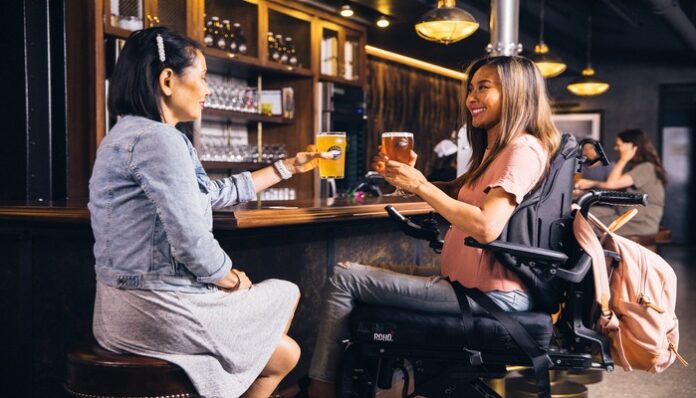
As a person with multiple physical disabilities, I have a complex relationship with my body — and I always have. I’m a full-time wheelchair user, so I often rely on others to help me with my basic needs, which often include transfers.
The thing is, people who need help with transferring often face pressure to be as lightweight as possible so that others can easily help them, and that can cause body image issues.
When I started puberty, my parents sat me down for “the talk,” but it wasn’t the same “talk” that my able-bodied peers received. Instead of telling me how babies were made, my parents lectured me on eating junk food.
They would explain that they were worried about me and that my aides needed to be able to lift me, so I needed to watch what I ate.
This was the beginning of a long cycle where I would agree to eat healthily for a little while but continue to eat whatever I wanted. Sure, I’d eat healthy food and stop getting seconds for a couple of days, but then, I went right back to how I always ate. I even tried some workouts, but they never lasted long.
I hoped that agreeing with my parents would stop them from having this conversation with me in the first place, but because I wanted to choose what I ate and absolutely loved junk food, the cycle would repeat itself.
My mom and I even went on diets together, and I hated dieting because I thought that going on a diet meant that something was “wrong” with me.
Dieting made me put a lot of focus on how my body looked.
When I dieted, I regularly asked my friends what they thought about my body, and they all acted like I didn’t need to diet. This made me feel relieved, but I knew that a lot of people wouldn’t understand that the pressure I faced to diet was because of my mobility.
My relationship with food, my body, and my disability is complex.
If I eat too much, I gain weight, and then it’s hard for aides to lift me. If I don’t eat enough, I don’t get the energy and nutrients that my body needs. In my eyes, it’s a lose-lose situation.
Now, it’s not just my parents commenting on my weight. The aides who help me with day-to-day activities often tell me that they feel like I’m getting heavier. I understand that they need to be able to lift me, but their comments on my body can feel really uncomfortable. These conversations used to make me justify looking at nutrition labels and choosing certain foods over others more often than I should have been.
The good news is that now, my relationship with food and my body is a lot better than it’s been in years.
By my own choice, I eat a vegetarian diet, but I also eat my favorite snacks with little to no guilt. I also regularly meet with a nutritionist because I have blood pressure issues, and I’m trying to use my current food choices to get my blood pressure under control.
In the past, when I heard comments about my weight and my parents encouraged me to diet, I thought that something was “wrong” with me. However, I eventually realized that all these comments on my body stemmed from other people’s need to make my body “convenient” for them. With the support of my friends, I now know that just because I have a disability doesn’t mean that I have to make my body “convenient” for others. Whether you’re disabled and struggle with the same issues I did or you’re able-bodied and constantly wish you had a different body, your body is perfect the way it is. Never let anyone tell you otherwise.
Featured Photo by ELEVATE on Pexels.


















